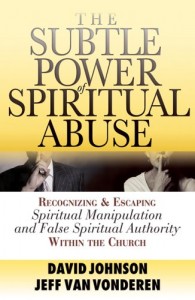
We continue our Thursday series blogging through “The Subtle Power of Spiritual Abuse.” The first post in the series is here.
Next week we move on to Part Three, which is focused on recovery. Let’s review where we are and how we got here.
There is a summary of Part One and introduction to Part Two on page 107, and a summary of Part Two and an intro to Part Three on page 181.
Part One (chapters 1–8) was an overview of what a spiritually abusive system looks like. The main component is power that is postured, rather than real spiritual authority being demonstrated. Abusive systems continue to re-abuse victims.
Part Two (chapters 9–16) was a look at the leaders in spiritually abusive systems. Abusive systems depend on having strong central leaders who seem to have a special knowledge of God in order to attract those who are hungry for the life of God. It is emphasized that many leaders who became abusive did not set out to be; perhaps they slid into it after being burned out or for one reason or another lost sight of the true grace of God.
Part Three (chapters 17–21) is about recovery. Chapter 17 describes how we get caught in the trap. Chapters 18 and 19 are about renewing the mind and recovering a right focus. The closing chapters, 20 and 21, consider when it’s best to stay and when it’s best to leave: “fight” or “flight.”
We are two-thirds of the way through the book! It is a good moment to congratulate ourselves on our progress. Now is a good time to take a step back and ask if anyone has any general questions or comments about the material thus far, or if there are any expectations for the final section. Has anything in particular been helpful? Is there anything you would change or say differently? If you could send a message to the authors of the book, what would you say?
Something that has stood out to me: I feel it has been helpful and instructive to see how Jesus’ rebukes to the Pharisees apply today to spiritually abusive systems. One image that stands out is of them washing the outside of the cup while the inside remains dirty. Surely we could never be tempted to do such a thing! (cough, cough) Another image is carefully straining out all the gnats but swallowing camels. I believe the description of the can’t-talk rule is right on, and I love seeing Jesus as the breaker of the can’t-talk rule when he literally upset the apple cart in throwing the money changers out of the temple. At first I was intrigued that abusive systems have power-posturing (vs. true spiritual authority) in common, then I was surprised to read that it is the main component. I would not have known to describe it that way before reading the book, but it makes sense. This underscores the weight of Jesus’ words about how leaders in his kingdom are to be servants (foot-washing, for example), not power-grabbers who lord it over those underneath them.
Every group of people and every leader is imperfect; mistakes will be made. What line is crossed when normal levels of imperfection become abuse? The line that divides shepherds from wolves in sheep’s clothing is that shepherds use their position and abilities to nurture and serve the sheep, but wolves devour the sheep for their own needs.
Thank you to each and every person who has dropped in for one or more chapters, either to read or discuss.
One of my desires for this series is that, in the long run, it is as helpful in encouraging people in their journey to healing as it is in identifying the problems of spiritual abuse. It is necessary to diagnose the disease, but after that it is even more important to pursue good health. If you have any lessons to share from your journey forward, we’d love to hear from you in the comments below.
(Click here to go on to Chapter 17)






















[...] (Click here to go on to next chapter) All articles on this site reflect the views of the author(s) and do not necessarily reflect the views of other Recovering Grace contributors or the leadership of the site. Students who have survived Gothardism tend to end up at a wide variety of places on the spiritual and theological spectrum, thus the diversity of opinions expressed on this website reflects that. For our official statement of beliefs, click here. Featured ArticleRG Book Club appearances authority control evangelism false teaching grace hypocrisy legalism motives spiritual abuse standards [...]
[...] The Subtle Power of Spiritual Abuse, Introduction to Part Three [...]